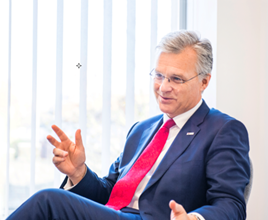Carne takes a deep breath. “I agree with the National Audit Office report,” he says with commendable honesty. “The Great Western electrification project is an almost text book example of how not to initiate a major programme. I absolutely agree with that - I said it at the Public Accounts Committee last year, and I’ll say it again this year.”
We all know the DfT hasn’t helped by changing its mind, ordering the trains before planning the infrastructure they’d run on… but we are where we are, in that respect.
“We are where we are, but let’s also recognise that while last year was really bad, we rebalanced the portfolio. We still have £15.7 billion to spend, and we are actually pretty much on target to deliver that. We are going to hit all of the major milestones this year.
“We’ve had hugely successful major programmes that have worked - the Severn Tunnel, Patchway Tunnel, every Bank Holiday has successfully delivered extraordinary work in the last two years. Yes, there have been blips, but this is actually an organisation which is delivering - I would say delivering brilliantly - on a huge portfolio of projects. We are investing £100 million every week improving Britain’s railways, and that’s something to be proud of.”
Yes it is, but it has to be spent properly, doesn’t it? And that demands world-class scoping. Does Carne accept that there has been poor scoping, poor costing and poorly initiated projects? If so, has he now ‘got a grip’ on that? And if he has, then how long before the backlog of poorly scoped, costed and implemented projects are flushed through the system to be replaced by best practice and rapidly improving efficiency?
To his credit, he takes this on the nose. “Well you’re exactly right. Those will have to work out through the system…”
So how long before all we see are properly specified projects, being implemented to world’s best standards?
The answer is much more careful… guarded: “Well, we are not going to put any projects into CP6 that haven’t been properly scoped. We are not going to agree and approve major projects with funders until we know what it’s going to cost and how long it’s going to take. That was a commitment that we made last year and that’s exactly how we are working today.
“But yes, you’re right, we do have a whole series of programmes where problems are still going to emerge, because of the way they were born. Unfortunately, that’s going to continue…”
For how long?
“Well until, bluntly...”
Two years? Five years?
“Well until these projects are completed we will still have some of those issues.”
Presumably there must be a forecast…? Can you share it? I fear I will not get a completely clear and unequivocal answer. He dives into the specifics of NR’s biggest embarrassment.
“Look at Great Western. I think we’ve got a very good grip on it now, but it’s not free of risk because it still has a lot of the features of a project born in the way that it was. You can’t change horses midstream. I wouldn’t have set it up in this way if we were to do it all again - but I can’t change it midstream, so you just make the best of what you’ve got… put your best people on it and do what you can to deliver… and that’s what they’re doing.”
What about the alleged High Output Plant System train for installing lineside catenary masts at the rate of around 24 a night, but which has been doing maybe seven or eight? Clearly it was unsuitable for the role, otherwise it would be working perfectly? Was that part of the poorly-specified past that needs to be worked out of the system?
“Yes, it absolutely was,” he replies evenly, although he can’t be enjoying this much. “There are two aspects - firstly we bought a piece of equipment for a project which had been approved and agreed, with assumptions made about achievable delivery. All this was completely untested and had never been done before, so huge assumptions were made that we then tried to play out. But we found we just couldn’t deliver, for lots of reasons.”
Again, full marks for not wriggling. So is Carne saying that we won’t see that again - these assumptions will all be properly stress-tested and fully scoped on all projects in future?
“Absolutely.”
So by the time we see a project to remodel the King’s Cross station throat, for example, it will have been looked at from every possible angle?
“Exactly that,” he replies with great emphasis and clarity. “Let me give you a really good example - the trans-Pennine upgrade. When that was unpaused last year we undertook to come back at the end of 2017 with a proper design to deliver the required outputs. That’s what we will deliver. I don’t yet know what it’s going to cost and I don’t know when it’s going to be finished - because I haven’t done the work yet.”
But wasn’t the GRIP investment approval process supposed to avoid all these issues? Was NR just not going by its own procedures? Was it just being widely optimistic - or were the people not competent…?”
That stirs him. “No. No!” he counters. “This is not about competence. The system worked by listing projects together with an estimate of costs, accompanied by a regulatory process featuring an enhancement cost-adjust mechanism which allowed NR to borrow more money if it ended up costing more. That was planned. So everybody acknowledged - and clearly knew up front - that cost estimates really were approximate and that it might cost more. And the regulator even built a system to allow this.”













Login to comment
Comments
No comments have been made yet.